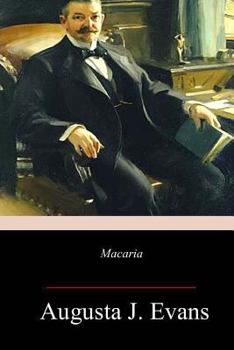Macaria
Select Format
Select Condition 
Book Overview
Augusta J. Evans was a Southern writer in the late 19th century who was instrumental in writing historical fiction that depicted and romanticized life in the South during the 1800s. This description may be from another edition of this product.
Format:Paperback
Language:English
ISBN:1981702253
ISBN13:9781981702251
Release Date:December 2017
Publisher:Createspace Independent Publishing Platform
Length:148 Pages
Weight:0.46 lbs.
Dimensions:0.3" x 6.0" x 9.0"
Related Subjects
Fiction History Literary Literary Criticism & Collections Literature Literature & FictionCustomer Reviews
1 rating
Valueable Example of Confederate Propaganda
Published by Thriftbooks.com User , 25 years ago
When I discovered Drew Gilpin Faust's edition of Augusta evans's novel, _Macaria; or Altars of Sacrifice_ while working on a college research paper, I was excited to find an example of the writing of a woman I had read brief mentions of in various books and an example of fiction published in the South during the Civil War. Although Evans's writing is flawed, as was pointed out even during her lifetime, when writing was often more flowery, by occasional digressions to show off Evans's learning--as when one of the duel heroines has been observing the stars through her telescope and muses on astronomical history--Evans's story is compelling and valueable. The story concerns two heroines living in Mobile, where Evans lived by this time: Irene Huntingdon, who has been raised in luxury but seeks to be strong and to find meaning in her life instead of simply spending her time and her father's wealth on fashion and shallow socializing, and Irene's poorer, artistic friend, Electra Grey, with whom Irene remains friends despite both a longstanding grudge that Irene's father holds against Electra's family and Irene and Electra's enduring love for the same man. Faust explains in the introduction that a Union general banned his soldiers' reading of _Macaria_, which had been republished by her antebellum New York publisher soon after its publication; while Evans's southern characters often showed too much materialism, snobbery, and insensitivity to make the South seem like an unquestionably superior region, her refusal to write as if she accepted the by then explicit northern view of slavery as a centrally important issue in the war and her portrayal of her central characters' personal growth do give strong signs of why the general who banned it might have worried that it would weaken some people's commitment to restore the union and to accept the view of the war, promoted by the time of its publication, as a fight against slavery. A final reason for _Macaria_'s value is its resolution of the question of women's role in the South, regardless of class, at least as viewed in the emergency period of the civil War; _Macaria_ does not end with the usual conventions of nineteenth-century domestic novels, and Faust's introduction provides some mixed contemporary southern reactions to the way in which Evans chose to end her heroines' story.






